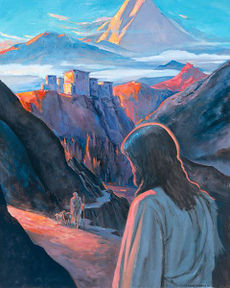Issa: Difference between revisions
m (Link) |
(translate tags, links) |
||
| Line 1: | Line 1: | ||
[[File:0001166 jesus-approaching-ladakh-900-G 600.jpeg|thumb|upright|alt=caption|Jesus Approaching Ladakh as a Youth]] | <languages /> | ||
[[File:0001166 jesus-approaching-ladakh-900-G 600.jpeg|thumb|upright|alt=caption|<translate>Jesus Approaching Ladakh as a Youth</translate>]] | |||
<translate> | |||
In 1887, a Russian physician, Nicolas Notovitch, journeyed to the Tibetan city of Himis, high in the Himalayan range, in search of ancient writings on the life of a man the Buddhists called Saint Issa. At the Himis monastery, the head lama read to him from ancient manuscripts, and Notovitch wrote down the story of Issa—an Israelite who traveled to the East to study the sacred scriptures and then returned to teach his people in Palestine, where he was crucified. | In 1887, a Russian physician, Nicolas Notovitch, journeyed to the Tibetan city of Himis, high in the Himalayan range, in search of ancient writings on the life of a man the Buddhists called Saint Issa. At the Himis monastery, the head lama read to him from ancient manuscripts, and Notovitch wrote down the story of Issa—an Israelite who traveled to the East to study the sacred scriptures and then returned to teach his people in Palestine, where he was crucified. | ||
The parallels between Saint Issa and Jesus were remarkable, leading Notovitch to conclude that the manuscripts provided the account, absent from the Bible, of Jesus’ life between age 13 and 30. He published the story of his discovery in 1890 in ''Life of Saint Issa'' (English trans. ''The Unknown Life of Christ'', 1895). According to Notovitch, the original Pali manuscripts of the life of Saint Issa were in the library of Lhasa in [[Tibet]] where the Dalai Lama resided. | The parallels between Saint Issa and [[Jesus]] were remarkable, leading Notovitch to conclude that the manuscripts provided the account, absent from the Bible, of Jesus’ life between age 13 and 30. He published the story of his discovery in 1890 in ''Life of Saint Issa'' (English trans. ''The Unknown Life of Christ'', 1895). According to Notovitch, the original Pali manuscripts of the life of Saint Issa were in the library of Lhasa in [[Tibet]] where the Dalai Lama resided. | ||
Critics claimed that Notovich’s account of the manuscripts was false. However, in 1922, Swami Abhedananda, a scholar and disciple of the Hindu Saint Ramakrishna, saw the same documents at Himis. [[Nicholas Roerich]], Russian archaeologist, author, artist, philosopher saw the same, or similar, documents in 1925. Roerich also discovered Jesus’ journey to the East recorded in the oral history of the region. He said, “In what possible way could a recent forgery penetrate into the consciousness of the whole East?” | Critics claimed that Notovich’s account of the manuscripts was false. However, in 1922, Swami Abhedananda, a scholar and disciple of the Hindu Saint [[Ramakrishna]], saw the same documents at Himis. [[Nicholas Roerich]], Russian archaeologist, author, artist, philosopher saw the same, or similar, documents in 1925. Roerich also discovered Jesus’ journey to the East recorded in the oral history of the region. He said, “In what possible way could a recent forgery penetrate into the consciousness of the whole East?” | ||
== See also == | == See also == | ||
| Line 20: | Line 22: | ||
Elizabeth Clare Prophet, October 6, 1987. | Elizabeth Clare Prophet, October 6, 1987. | ||
</translate> | |||
Revision as of 05:41, 26 June 2021

In 1887, a Russian physician, Nicolas Notovitch, journeyed to the Tibetan city of Himis, high in the Himalayan range, in search of ancient writings on the life of a man the Buddhists called Saint Issa. At the Himis monastery, the head lama read to him from ancient manuscripts, and Notovitch wrote down the story of Issa—an Israelite who traveled to the East to study the sacred scriptures and then returned to teach his people in Palestine, where he was crucified.
The parallels between Saint Issa and Jesus were remarkable, leading Notovitch to conclude that the manuscripts provided the account, absent from the Bible, of Jesus’ life between age 13 and 30. He published the story of his discovery in 1890 in Life of Saint Issa (English trans. The Unknown Life of Christ, 1895). According to Notovitch, the original Pali manuscripts of the life of Saint Issa were in the library of Lhasa in Tibet where the Dalai Lama resided.
Critics claimed that Notovich’s account of the manuscripts was false. However, in 1922, Swami Abhedananda, a scholar and disciple of the Hindu Saint Ramakrishna, saw the same documents at Himis. Nicholas Roerich, Russian archaeologist, author, artist, philosopher saw the same, or similar, documents in 1925. Roerich also discovered Jesus’ journey to the East recorded in the oral history of the region. He said, “In what possible way could a recent forgery penetrate into the consciousness of the whole East?”
See also
For more information
Elizabeth Clare Prophet, The Lost Years of Jesus: Documentary Evidence of Jesus’ 17-Year Journey to the East.
Sources
Pearls of Wisdom, vol. 25, no. 58.
Elizabeth Clare Prophet, October 6, 1987.
